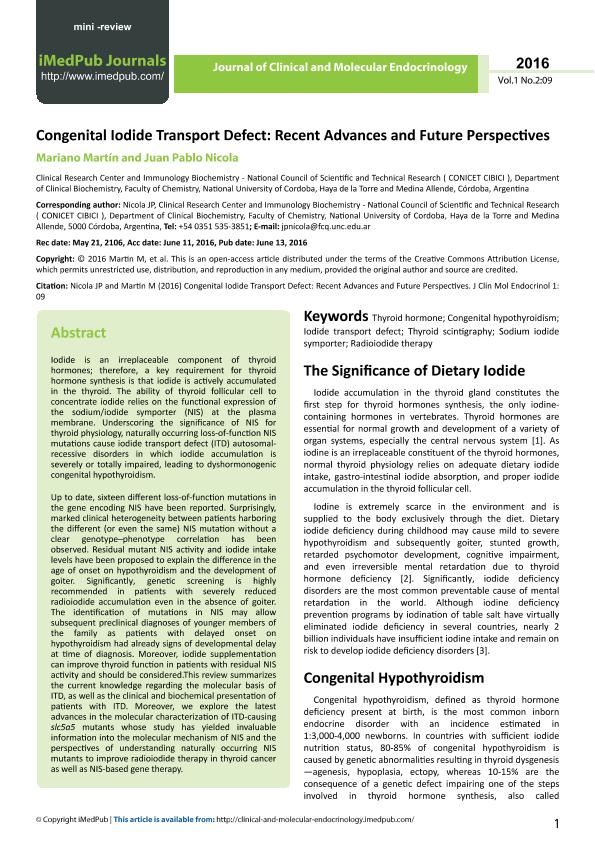Mostrar el registro sencillo del ítem
dc.contributor.author
Martín, Mariano

dc.contributor.author
Nicola, Juan Pablo

dc.date.available
2018-05-31T13:54:44Z
dc.date.issued
2016-06
dc.identifier.citation
Martín, Mariano; Nicola, Juan Pablo; Congenital iodide transport defect: recent advances and future perspectives; iMedPub Journals; Journal of Clinical and Molecular Endocrinology; 1; 2; 6-2016
dc.identifier.issn
2572-5432
dc.identifier.uri
http://hdl.handle.net/11336/46764
dc.description.abstract
Iodide is an irreplaceable component of thyroid hormones; therefore, a key requirement for thyroid hormone synthesis is that iodide is actively accumulated in the thyroid. The ability of thyroid follicular cell to concentrate iodide relies on the functional expression of the sodium/iodide symporter (SIS) at the plasma membrane. Underscoring the significance of SIS for thyroid physiology, naturally occurring loss-of-function SIS mutations cause iodide transport defect (ITD) autosomalrecessive disorders in which iodide accumulation is severely or totally impaired, leading to dyshormonogenic congenital hypothyroidism. Up to date, sixteen different loss-of-function mutations in the gene encoding SIS have been reported. Surprisingly, marked clinical heterogeneity between patients harboring the different (or even the same) SIS mutation without a clear genotype–phenotype correlation has been observed. Residual mutant SIS activity and iodide intake levels have been proposed to explain the difference in the age of onset on hypothyroidism and the development of goiter. Significantly, genetic screening is highly recommended in patients with severely reduced radioiodide accumulation even in the absence of goiter. The identification of mutations in SIS may allow subsequent preclinical diagnoses of younger members of the family as patients with delayed onset on hypothyroidism had already signs of developmental delay at time of diagnosis. Moreover, iodide supplementation can improve thyroid function in patients with residual SIS activity and should be considered. This review summarizes the current knowledge regarding the molecular basis of ITD, as well as the clinical and biochemical presentation of patients with ITD. Moreover, we explore the latest advances in the molecular characterization of ITD-causing slc5a5 mutants whose study has yielded invaluable information into the molecular mechaSISm of SIS and the perspectives of understanding naturally occurring SIS mutants to improve radioiodide therapy in thyroid cancer as well as SIS-based gene therapy.
dc.format
application/pdf
dc.language.iso
eng
dc.publisher
iMedPub Journals
dc.rights
info:eu-repo/semantics/openAccess
dc.rights.uri
https://creativecommons.org/licenses/by-nc-sa/2.5/ar/
dc.subject
Congenital Hypothyrodism
dc.subject
Iodide Transport Defect
dc.subject
Sodium Iodide Symporter
dc.subject
Plasma Membrane Targeting
dc.subject.classification
Inmunología

dc.subject.classification
Medicina Básica

dc.subject.classification
CIENCIAS MÉDICAS Y DE LA SALUD

dc.title
Congenital iodide transport defect: recent advances and future perspectives
dc.type
info:eu-repo/semantics/article
dc.type
info:ar-repo/semantics/artículo
dc.type
info:eu-repo/semantics/publishedVersion
dc.date.updated
2018-05-22T21:48:53Z
dc.journal.volume
1
dc.journal.number
2
dc.journal.pais
Reino Unido

dc.description.fil
Fil: Martín, Mariano. Consejo Nacional de Investigaciones Científicas y Técnicas. Centro Científico Tecnológico Córdoba. Centro de Investigaciones en Bioquímica Clínica e Inmunología; Argentina
dc.description.fil
Fil: Nicola, Juan Pablo. Consejo Nacional de Investigaciones Científicas y Técnicas. Centro Científico Tecnológico Córdoba. Centro de Investigaciones en Bioquímica Clínica e Inmunología; Argentina
dc.journal.title
Journal of Clinical and Molecular Endocrinology
dc.relation.alternativeid
info:eu-repo/semantics/altIdentifier/url/https://bit.ly/2H7lSTy
Archivos asociados
